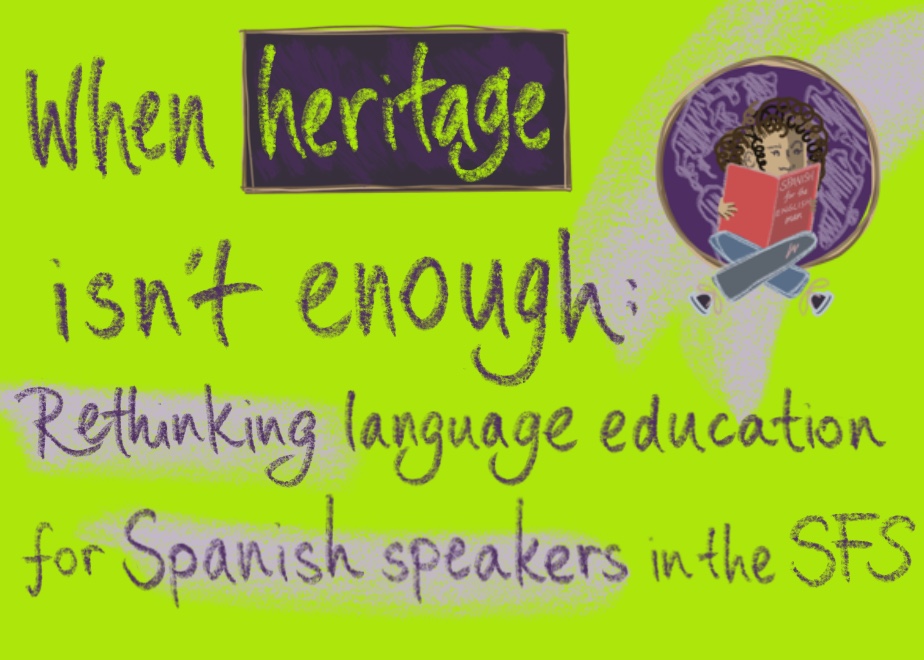Spanish has always been a part of who I am. Ever since I can remember, my mom has said, “respond to me in Spanish so you don’t forget your culture.” So I did.
I speak to my family in Spanish, and as a result, my language skills have become a point of pride. From talking to my abuela to listening to Spanish music, language has enabled me to stay true to my heritage.
When I enrolled in Georgetown’s SFS, I was required to achieve proficiency in a foreign language to graduate, proven through an oral and reading assessment. Spanish was the natural choice. I took a language placement exam, thinking I would quickly be cleared to take the proficiency test. But the results indicated that I needed to enroll in Spanish classes. Although I spoke fluently, I was told by the Spanish department that I was not up to the institutional standard and capable of discussing advanced topics such as international relations.
I am a heritage speaker: someone who grew up in a home where their heritage language was the primary language, but did not attend school in or receive formal training in that language. After struggling to prove my language ability to the SFS, I realized that in academic settings, the validity of heritage speakers’ language skills is frequently questioned. Students are caught between their lived experience speaking a language at home and the pressure to prove they meet the language’s academic standards.
It is difficult to estimate the number of heritage speakers in the United States, but 57% of U.S.-born Hispanics can at least carry a conversation in Spanish “pretty well,” according to the Pew Research Center. Heritage speakers are especially prominent in Hispanic-American communities where children are spoken to in Spanish, but attend English-language schools.
However, Spanish heritage speakers don’t fit neatly into any one category. Some speak “Spanglish,” mixing English and Spanish, whereas others speak both equally well. The topics heritage speakers discuss at home also vary widely across families, meaning vocabulary can be different.
Furthermore, heritage speakers occupy a distinct space within the sphere of Spanish language learning. Native speakers attended school in Spanish and sat through basic grammar lessons, while second language learners also learned the grammar rules in order to master the language. Heritage speakers have neither experience. This doesn’t make them any less valid in their language use, but assessments used to quantify language ability fail to adjust to these unique situations.
While heritage speakers’ oral fluency often reflects deep cultural and familial ties, their literacy skills—reading and writing ability—can vary widely. I personally text in Spanish, read TikTok comments in Spanish, and even read Mexican news articles my family sends me.
The SFS proficiency exams require students to read a news article and discuss it in a foreign language. It’s fair for the SFS to question heritage speakers’ abilities to read and write, but not to assume that all heritage speakers can only speak.
Furthermore, since Spanish uses the Latin alphabet and follows a highly phonetic system, it is much easier for Spanish heritage speakers to learn to read and write compared to other languages. Those who already speak the language can often transfer their oral fluency into writing fairly easily.
It is understandable that heritage speakers should demonstrate literacy, but in general, Georgetown’s SFS needs a new outlook when teaching Spanish heritage speakers. Although the Spanish department offers two advanced Spanish classes for heritage speakers, there is often limited availability, and sometimes the classes are canceled due to low enrollment. The courses also don’t focus on Latin American politics, instead centering on Hispanic communities in the United States. A faculty member told me not to register for the class, as it would not prepare me for the proficiency test.
If the SFS wants heritage speakers to take language classes, they have to meet students where they’re at.
This means teaching Spanish differently to these students. Heritage speakers may know how to use grammatical structures in practice, but are unaccustomed to the specific grammar rules and academic jargon. Professors should be aware of this when teaching heritage students. They should make grammar explanations example-based instead of definition-based, since it’s easier for heritage speakers to understand how to use language rather than how linguistic terms are defined.
Professors also need a more informed perspective when they teach heritage speakers. I had a professor get defensive when I attended office hours trying to clarify a conjugation question, telling me, “There’s nothing left for me to teach you.” Particularly, non-native Spanish professors must realize that heritage speakers don’t threaten their teaching abilities and can provide valuable insights into the lived realities of Spanish learning.
For instance, heritage speakers often use unique vocabulary and idioms from wherever their parents are from, speaking a more colloquial form of Spanish. This would expose other students to different forms of Spanish and enable them to communicate better throughout Latin America.
As the SFS seeks to preserve the formality and standardization of language, it is harmful to look down upon heritage speakers because of their background. Instead of seeking to change them, the SFS must recognize how heritage speakers at Georgetown serve as a bridge between American and Hispanic cultures and expand students’ approach to language learning. By supporting the diverse experiences heritage speakers bring, institutions can create a more inclusive approach to language education.







The SFS is not testing you for ability to speak Spanish with your parents, or to go to a restaurant and order Spanish. We are looking for students who are capable of working in foreign service positions and communicating with others in Spanish (or their chosen language of proficiency). This requires knowledge of proper grammar, vocabulary, and cultural factors. The author acknowledges they are unfamiliar with these, and while they may enter with a slightly different profile then most students, they are not proficient.